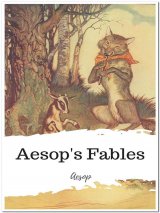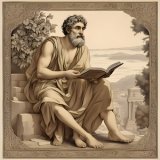Aesop's Fables Page #3
Aesop's Fables, or the Aesopica, is a collection of fables credited to Aesop, a slave and storyteller believed to have lived in ancient Greece between 620 and 564 BCE.
THE NORTH WIND AND THE SUN A dispute arose between the North Wind and the Sun, each claiming that he was stronger than the other. At last they agreed to try their powers upon a traveller, to see which could soonest strip him of his cloak. The North Wind had the first try; and, gathering up all his force for the attack, he came whirling furiously down upon the man, and caught up his cloak as though he would wrest it from him by one single effort: but the harder he blew, the more closely the man wrapped it round himself. Then came the turn of the Sun. At first he beamed gently upon the traveller, who soon unclasped his cloak and walked on with it hanging loosely about his shoulders: then he shone forth in his full strength, and the man, before he had gone many steps, was glad to throw his cloak right off and complete his journey more lightly clad. Persuasion is better than force THE MISTRESS AND HER SERVANTS A Widow, thrifty and industrious, had two servants, whom she kept pretty hard at work. They were not allowed to lie long abed in the mornings, but the old lady had them up and doing as soon as the cock crew. They disliked intensely having to get up at such an hour, especially in winter-time: and they thought that if it were not for the cock waking up their Mistress so horribly early, they could sleep longer. So they caught it and wrung its neck. But they weren't prepared for the consequences. For what happened was that their Mistress, not hearing the cock crow as usual, waked them up earlier than ever, and set them to work in the middle of the night. THE GOODS AND THE ILLS There was a time in the youth of the world when Goods and Ills entered equally into the concerns of men, so that the Goods did not prevail to make them altogether blessed, nor the Ills to make them wholly miserable. But owing to the foolishness of mankind the Ills multiplied greatly in number and increased in strength, until it seemed as though they would deprive the Goods of all share in human affairs, and banish them from the earth. The latter, therefore, betook themselves to heaven and complained to Jupiter of the treatment they had received, at the same time praying him to grant them protection from the Ills, and to advise them concerning the manner of their intercourse with men. Jupiter granted their request for protection, and decreed that for the future they should not go among men openly in a body, and so be liable to attack from the hostile Ills, but singly and unobserved, and at infrequent and unexpected intervals. Hence it is that the earth is full of Ills, for they come and go as they please and are never far away; while Goods, alas! come one by one only, and have to travel all the way from heaven, so that they are very seldom seen. THE HARES AND THE FROGS The Hares once gathered together and lamented the unhappiness of their lot, exposed as they were to dangers on all sides and lacking the strength and the courage to hold their own. Men, dogs, birds and beasts of prey were all their enemies, and killed and devoured them daily: and sooner than endure such persecution any longer, they one and all determined to end their miserable lives. Thus resolved and desperate, they rushed in a body towards a neighbouring pool, intending to drown themselves. On the bank were sitting a number of Frogs, who, when they heard the noise of the Hares as they ran, with one accord leaped into the water and hid themselves in the depths. Then one of the older Hares who was wiser than the rest cried out to his companions, "Stop, my friends, take heart; don't let us destroy ourselves after all: see, here are creatures who are afraid of us, and who must, therefore, be still more timid than ourselves." THE FOX AND THE STORK A Fox invited a Stork to dinner, at which the only fare provided was a large flat dish of soup. The Fox lapped it up with great relish, but the Stork with her long bill tried in vain to partake of the savoury broth. Her evident distress caused the sly Fox much amusement. But not long after the Stork invited him in turn, and set before him a pitcher with a long and narrow neck, into which she could get her bill with ease. Thus, while she enjoyed her dinner, the Fox sat by hungry and helpless, for it was impossible for him to reach the tempting contents of the vessel. THE WOLF IN SHEEP'S CLOTHING A Wolf resolved to disguise himself in order that he might prey upon a flock of sheep without fear of detection. So he clothed himself in a sheepskin, and slipped among the sheep when they were out at pasture. He completely deceived the shepherd, and when the flock was penned for the night he was shut in with the rest. But that very night as it happened, the shepherd, requiring a supply of mutton for the table, laid hands on the Wolf in mistake for a Sheep, and killed him with his knife on the spot. THE STAG IN THE OX-STALL A Stag, chased from his lair by the hounds, took refuge in a farmyard, and, entering a stable where a number of oxen were stalled, thrust himself under a pile of hay in a vacant stall, where he lay concealed, all but the tips of his horns. Presently one of the Oxen said to him, "What has induced you to come in here? Aren't you aware of the risk you are running of being captured by the herdsmen?" To which he replied, "Pray let me stay for the present. When night comes I shall easily escape under cover of the dark." In the course of the afternoon more than one of the farm-hands came in, to attend to the wants of the cattle, but not one of them noticed the presence of the Stag, who accordingly began to congratulate himself on his escape and to express his gratitude to the Oxen. "We wish you well," said the one who had spoken before, "but you are not out of danger yet. If the master comes, you will certainly be found out, for nothing ever escapes his keen eyes." Presently, sure enough, in he came, and made a great to-do about the way the Oxen were kept. "The beasts are starving," he cried; "here, give them more hay, and put plenty of litter under them." As he spoke, he seized an armful himself from the pile where the Stag lay concealed, and at once detected him. Calling his men, he had him seized at once and killed for the table. THE MILKMAID AND HER PAIL A farmer's daughter had been out to milk the cows, and was returning to the dairy carrying her pail of milk upon her head. As she walked along, she fell a-musing after this fashion: "The milk in this pail will provide me with cream, which I will make into butter and take to market to sell. With the money I will buy a number of eggs, and these, when hatched, will produce chickens, and by and by I shall have quite a large poultry-yard. Then I shall sell some of my fowls, and with the money which they will bring in I will buy myself a new gown, which I shall wear when I go to the fair; and all the young fellows will admire it, and come and make love to me, but I shall toss my head and have nothing to say to them." Forgetting all about the pail, and suiting the action to the word, she tossed her head. Down went the pail, all the milk was spilled, and all her fine castles in the air vanished in a moment!
Translation
Translate and read this book in other languages:
Select another language:
- - Select -
- 简体中文 (Chinese - Simplified)
- 繁體中文 (Chinese - Traditional)
- Español (Spanish)
- Esperanto (Esperanto)
- 日本語 (Japanese)
- Português (Portuguese)
- Deutsch (German)
- العربية (Arabic)
- Français (French)
- Русский (Russian)
- ಕನ್ನಡ (Kannada)
- 한국어 (Korean)
- עברית (Hebrew)
- Gaeilge (Irish)
- Українська (Ukrainian)
- اردو (Urdu)
- Magyar (Hungarian)
- मानक हिन्दी (Hindi)
- Indonesia (Indonesian)
- Italiano (Italian)
- தமிழ் (Tamil)
- Türkçe (Turkish)
- తెలుగు (Telugu)
- ภาษาไทย (Thai)
- Tiếng Việt (Vietnamese)
- Čeština (Czech)
- Polski (Polish)
- Bahasa Indonesia (Indonesian)
- Românește (Romanian)
- Nederlands (Dutch)
- Ελληνικά (Greek)
- Latinum (Latin)
- Svenska (Swedish)
- Dansk (Danish)
- Suomi (Finnish)
- فارسی (Persian)
- ייִדיש (Yiddish)
- հայերեն (Armenian)
- Norsk (Norwegian)
- English (English)
Citation
Use the citation below to add this book to your bibliography:
Style:MLAChicagoAPA
"Aesop's Fables Books." Literature.com. STANDS4 LLC, 2025. Web. 6 Jan. 2025. <https://www.literature.com/book/aesop%27s_fables_316>.




Discuss this Aesop's Fables book with the community:
Report Comment
We're doing our best to make sure our content is useful, accurate and safe.
If by any chance you spot an inappropriate comment while navigating through our website please use this form to let us know, and we'll take care of it shortly.
Attachment
You need to be logged in to favorite.
Log In